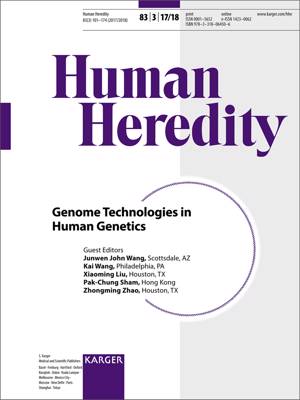
- Retrait gratuit dans votre magasin Club
- 7.000.000 titres dans notre catalogue
- Payer en toute sécurité
- Toujours un magasin près de chez vous
- Retrait gratuit dans votre magasin Club
- 7.000.000 titres dans notre catalogue
- Payer en toute sécurité
- Toujours un magasin près de chez vous
Genome Technologies in Human Genetics
Special Topic Issue: Human Heredity 2017/2018, Vol. 83, No. 3
Livre broché | Anglais
28,45 €
+ 56 points
Description
This year marks the 70th anniversary of 'Human Heredity'. The journal has seen all the major milestones in the field of human genetics. Through the accumulation of genomic data on large population samples, we now have unprecedented opportunities to uncover the complex genetic underpinnings of a disease, paving the way to precision medicine. These advances also pose new challenges: how to process, analyze, and integrate large-scale, multi-dimensional, genomic data with heterogeneous, complex phenotypes. Thus, bioinformatics has become indispensable for human genetics research. In recognition of this, 'Human Heredity' is publishing a special issue covering not only traditional areas of genotype imputation, genetic and epigenetic interactions, but also cutting-edge technologies such as single-cell RNA sequencing, deep learning, and multi-omics data integration. In this publication, current tools for genotype imputation from genome-wide association (GWAS) data are systematically evaluated. A statistical framework to integrate data from GWASs, expression quantitative trait loci, and protein-protein interactions has been developed, which could significantly improve the prediction accuracy. A novel, nonparametric, gene-centric approach is applied to test the interaction between SNPs and epigenetic CpG sites using the data from the Asthma BioRepository for Integrative Genomic Exploration (Asthma BRIDGE) project. A deep learning approach for tRNA prediction is introduced and 13 models are built from 3 popular deep learning architectures. Finally, a study on how the exome capture kit affects the quality of single-cell whole-exome sequencing is presented. 'Human Heredity' welcomes more submissions of high-quality manuscripts in bioinformatics, genomics, and computational biology.
Spécifications
Parties prenantes
- Editeur:
Contenu
- Nombre de pages :
- 74
- Langue:
- Anglais
Caractéristiques
- EAN:
- 9783318064506
- Format:
- Livre broché
- Dimensions :
- 210 mm x 280 mm






